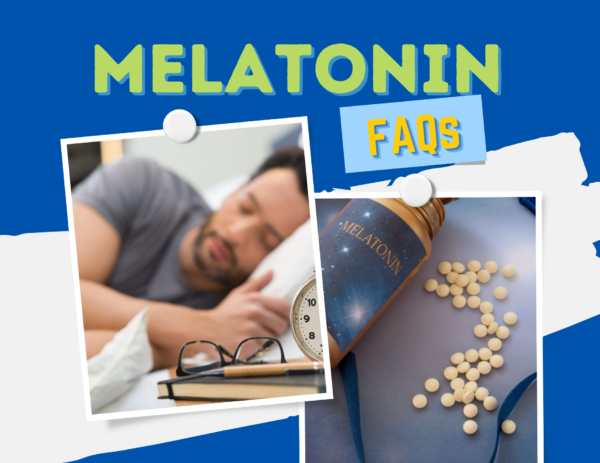
There are a lot of misconceptions floating around about what melatonin is and how to use it. Most people claim to use it as a “natural” sleep aid, but it doesn’t give an accurate picture of what melatonin supplementation does within the body. (I offer a list of natural sleep aids that aren’t synthetic hormones!) I want to address some of the frequently asked questions about melatonin and offer guidance on how to get a better night’s sleep.
What Is Melatonin?
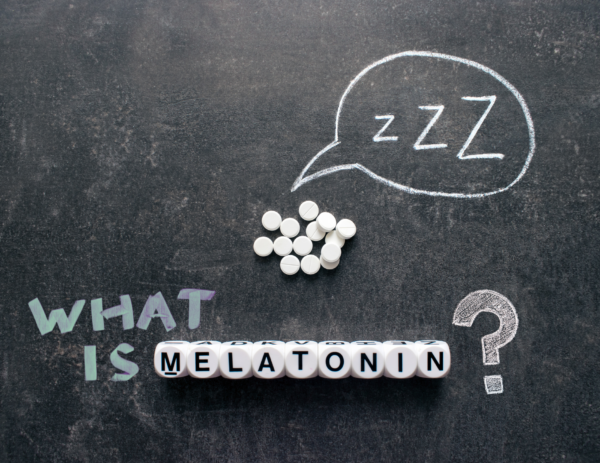
Melatonin is a hormone that is released throughout the body in response to the dark. It helps to regulate our circadian rhythm and our daily energy levels. Do you ever get that 2:30 feeling, or wake up when the sun rises? You can thank your circadian rhythm and hormones like melatonin.
How Does Melatonin Work in the Body?
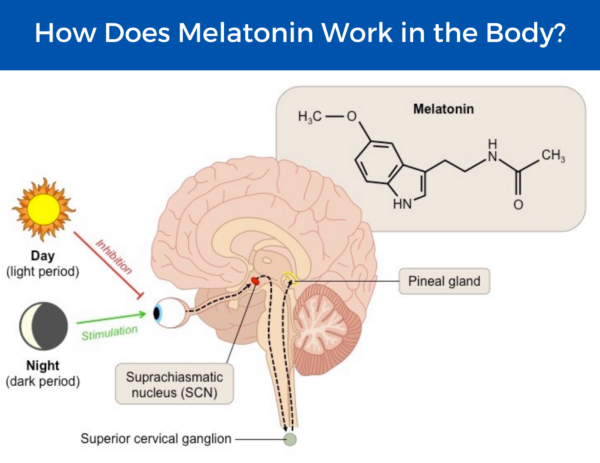
As night falls, our eyes detect that we are surrounded in darkness. The eyes communicate this to the brain, which sends a message to the pineal gland. The pineal gland begins to release the hormone melatonin.
Once melatonin is released, the body decreases its core temperature and respiration rate. Both of these functions help to induce sleep. Melatonin also inhibits the release of certain hormones that impact the reproductive system.
Why Do People Take Melatonin Supplements?
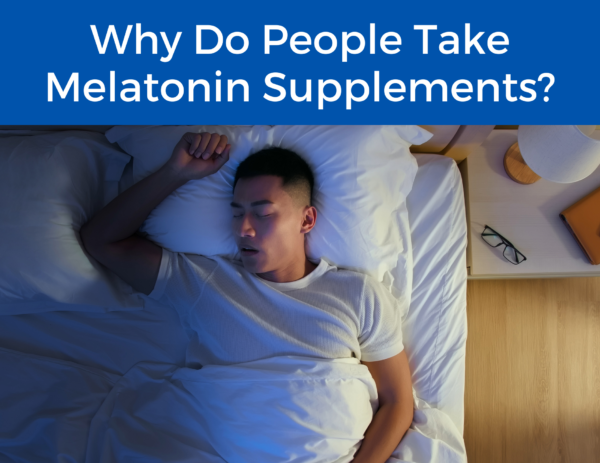
Melatonin supplements are often advertised or positioned as sleep aids. It’s not hard to see why. If melatonin production helps your body wind down at night, then taking melatonin will help you sleep, right? The answer is yes and no.
You can take melatonin supplements and fall asleep more easily. But this doesn’t mean you should continue taking them. Melatonin supplements are not actually the best choice when it comes to natural sleep aids.
Can Melatonin Help You Sleep Better?
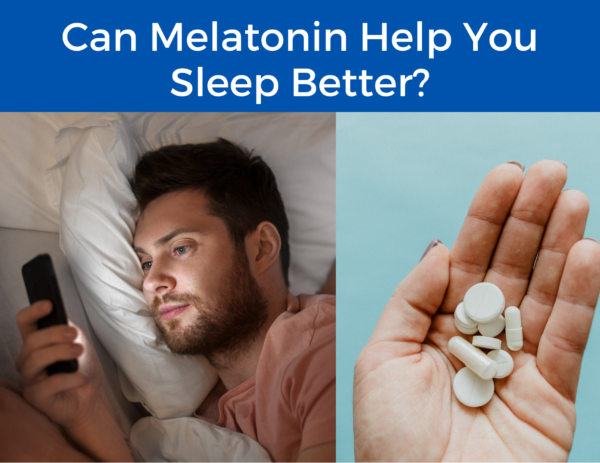
Sometimes, but not always. Melatonin supplements are best taken when melatonin is not being naturally produced. Often, we are not producing melatonin because we are exposing ourselves to light.
The body does not know the difference between artificial and natural light. When you look at your phone or read from an electronic reader, photoreceptors in your eyes turn it into electrical signals for your brain. The same process takes place when you look at the sun. The results are also the same when it comes to your circadian rhythm. Any type of artificial light, especially blue light, inhibits melatonin production.
Melatonin supplements are more effective when we need help adjusting our circadian rhythm. Taking on a night shift or flying to a new time zone throws our internal clock out of whack. Melatonin can reset it after one or two nights.
Do Melatonin Gummies Have Side Effects?

Taking melatonin every now and again is not likely to produce any side effects, but you may experience:
- Drowsiness
- Stomach pains
- Headaches
- Nausea
- Dizziness
- Irritability
- Abdominal cramps
Talk to your doctor or a medical professional before you take any natural sleep aid.
Can Taking Melatonin Affect Your Body’s Ability to Produce It?
No studies suggest that regular melatonin supplements will decrease the body’s ability to naturally produce melatonin. However, disrupted cycles, aging, and smoking may decrease this ability whether you take melatonin or not! Experts are also still learning how melatonin works with other forms of hormone therapy or medications.
Getting a good night’s sleep is crucial to the production of melatonin and other crucial hormones throughout the body.
Who Can Take Melatonin?

Most people can take melatonin. There are even melatonin gummies that are safe for children! Before you take melatonin, however, you should consult with your doctor. People who are pregnant, breastfeeding, or have an autoimmune disease should not use melatonin and consult their doctor for other sleep aids.
I think it is okay to take melatonin occasionally. When I fly across time zones and experience jet lag, I don’t mind taking melatonin. I know it will regulate my circadian rhythm and help me adjust to my surroundings. I don’t take it every day because it may cause more harm than good long-term.
Remember, melatonin is a hormone. Melatonin is actually derived from serotonin, which is derived from tryptophan. Medications that mess with serotonin also mess with melatonin production and release. Please discuss melatonin supplements and hormone therapy with your doctor before undergoing.
I talk about the problems with using melatonin as a regular sleep aid in my book The Sleep Solution.
Melatonin Vs. Magnesium – Which Is Better?
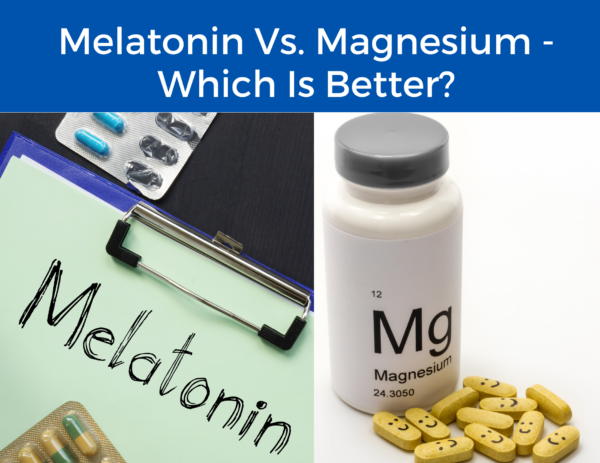
Instead of melatonin, I prefer to use magnesium as a natural sleep aid. Magnesium is not a hormone and taking it is not technically hormone replacement! Instead, this nutrient aids different bodily processes in a way that sets you up for a great night’s sleep.
Magnesium acts as a calcium blocker, and calcium helps the muscles contract. Consuming too much calcium and not enough magnesium puts a person at risk for a high heart rate, muscle cramps, and insomnia. When magnesium enters the body, it prevents the calcium from doing its job. As a result, the muscles begin to relax. At the same time, magnesium helps to lower the heart rate.
Although magnesium is one of the most abundant nutrients in the body, most people are not getting enough magnesium. Supplements can help to reach daily recommended levels and help you sleep at night.
What Natural Sleep Aids Should I Buy?
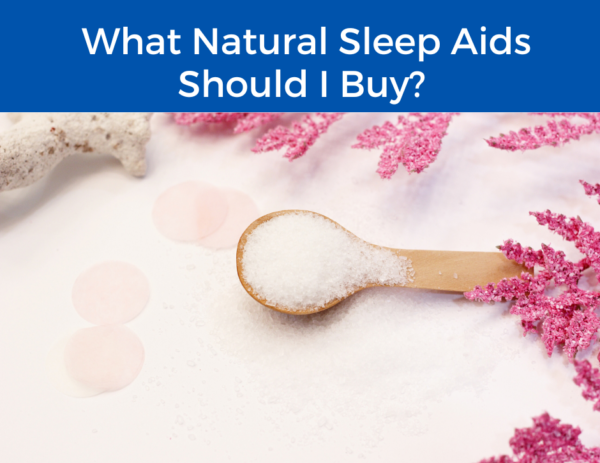
Want to try magnesium as a sleep aid? I recommend magnesium bisglycinate powder from Thorne.
You can also surround yourself with magnesium by soaking in a bath….
…or rubbing it on your skin at night! (This magnesium oil always does the trick for me!)
Have you made the switch to magnesium? Have further questions about melatonin?
Browse through our recommended sleep aids, try some for yourself, and add to the discussion by leaving a comment below.
Latest posts by Sylvie McCracken (see all)
- Treating H. Pylori (Part 3): What H. Pylori Does to the Body - August 8, 2022
- Treating H. Pylori (Part 2): How H. Pylori is Contracted - August 3, 2022
- Understanding Beef Labels: Organic, Pastured, Grass-Fed & Grain-Finished - July 25, 2022